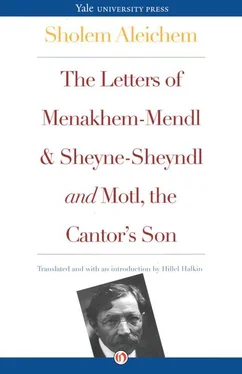I can’t tell you exactly how death inshurinks works. All I know is that it’s a dzhahb Elye turned down. He’d rather be a firnitsheh kehlehkteh. Inshurinks means talking. And talking some more. And talking more than that. Pinye is good at it. He could talk a wall into falling down. Pinye could sell death inshurinks to the dead.
Pinye couldn’t care less who you are. He has an answer for everything. If you already have inshurinks, you need more. If you don’t, you better take it out. If you don’t take it for yourself, you can take it for your wife, child, cousin, or nekstdawrikeh. Once Pinye gets you in his clutches, you’re done for.
Nekstdawrikeh inshurinks isn’t really for your next-door neighbor. It’s a way of earning a few hundred dahlehz from the inshurinks kahmpeni if he dies. And your nekstdawrikeh does the same: if you die first, the money is his. You both pay the kahmpeni a kvawdeh a week. The kahmpeni comes to get it. I mean the kehlehkteh does. That’s Pinye. He kehlehks your kvawdehz and keeps half for his kehmishn.
That’s kehlehktink. Taking out inshurinks for the first time is called reitink ah pahlisee. If Pinye is the eydzhent who reits it, he earns fifteen-to-one. That means that if the primyim is a kvawdeh a week, he gets fifteen kvawdehz from the kahmpeni in one shot. You can figure out for yourself what two or three pahliseez a day add up to. That’s a heap of kvawdehz. It’s like coming into an inheritance.
“God help us,” Brokheh says to Pinye. “You’re flooding the house with money!” You should see Taybl blush as she watches Pinye shake the nikelz and kvawdehz from his pockets.
“So, what did you think?” Pinye answers, making separate piles of the kvawdehz and the nikelz. “That Kahnegi, Vendehbilt, and Rahknfelleh were born millionaires?”
If I had a fresh sheet of paper, I’d take some charcoal and sketch. This is what I’d put in my picture:
A table. At the head of it sits my mother, her arms crossed on her chest. To one side of her is Brokheh — big and tall, with monster feet. To the other side is Taybl — a skinny little quarter of a chicken. Both are at work, one sewing and one knitting. My brother Elye sits at the table’s end, a grown man with a beard. In one hand he’s holding ah bahntsh kahdz and in the other some dahleh bilz. They’re what he kehlehkted today.
Pinye is hunched across from him, smooth-shaven, a real American. He’s emptying his pockets of kvawdehz and nikelz. Being nearsighted, he brings every kvawdeh and nikl to his nose. Two piles rise high on the table, one of kvawdehz and one of nikelz. Pinye goes on counting. He reaches into his pockets for more coins. You can see that his pockets are still bulging. They look ready to burst.
Nothing lasts forever. And no one is ever satisfied. We’re tired of going from door to door for kvawdehz and nikelz. Better your own slice of bread than the next man’s loaf. That’s what Brokheh says.
The first to sour on kehlehktink was Elye. He was fed up with the biznis. I mean it wasn’t the biznis, it was the kahstemehz. Some stopped paying. “You can take your firnitsheh back,” they told him. “We need it like a hole in the head.” Others were full of complaints. Why did the bed squeak? Why did they see two faces in the mirror? Why didn’t the chest of drawers open and close? How come the stool weighed a ton and was hard as nails to sit on?
Some kahstemehz disappeared. They had moved to another epahtment and go find them. Even worse were the ones who wanted to keep up the payments. They liked the firnitsheh, they just didn’t have the money. The man of the house was sick. Or out of work. Or on streik. What was Elye to do? Nobody wants to lose a kahstemeh. And so he paid for them out of his own pahkit. There was no end to it. You can imagine what it was like.
You think Pinye likes his dzhahb any better? Think again! It’s easier to cross the Red Sea, he says, than to land a kahstemeh. You talk to some idiot for three days and three nights, you explain what inshurinks is all about, you finally get him to fill out an eplikayshn — and the next day he’s changed his mind or been ridzhekted. That means some lowdown doctor wrote the truth. He saw the fellow naked and didn’t like what he saw.
The biggest disaster for an inshurinks eydzhent is a leps. A pahlisee lepsiz when a kahstemeh stops paying. Now it’s the eydzhent’s turn to pay the kahmpeni fifteen times the primyim. If not for all the lepsiz, Pinye says, he’d be a rich man. And it’s just his luck that several kahstemehz have lepst together. You would think they planned it that way.
“They can all go to hell, the kahstemehz and the inshurinks and the lepsiz and the kahmpeni!” Pinye says. It’s time he and Elye struck out on their own. They’ve each managed to save a few dahlehz. That’s enough to start a biznis.
It’s official. We’re going into biznis!
Whatever you’re looking for, you’ll find it in the noospeypehz, even if it’s bird’s milk. Work? It’s in the peypehz. Workers? They’re there, too. A husband or a wife? Also. A biznis? Try the peypehz again. That’s what we did for days until we came across the following ed-vehteizmint:
Sigahz — Stayshenree — Kendee–
Sawdehvawdeh Stend For Sale.
Across from a Skul. On Account of
Family Trahbelz. Gehrehntid Gud
Biznis. Hahry!
Leave it to Brokheh to think of everything that could go wrong. For one thing, she said, how did we know the edvehteizmint was telling the truth? And besides, why crawl into bed with a bunch of family trahbelz? It was probably some husband and his wife. Why get involved in a divorce case?
Maybe you think it was only this edvehteizmint that Brokheh didn’t like. Believe me, there were a hundred of them. She found something wrong with each. She was against whatever Elye was for. Just because he had gone and shaved off three-quarters of his beard, she said, he shouldn’t think he was such a big shot. “So what if I did?” Elye said. “Your father shaved off all four!”
That brought Pinye into it. “You know what?” he said. “I’ll give you odds that out of one hundred million Americans, you won’t find half a dozen with beards. Call me a blahfeh if I’m wrong.”
“What does that have to do with anything?” my mother asked. “If ducks go barefoot, that means I can’t wear shoes? Let’s change the subject.”
It was bad enough, she said, that Peysi the cantor’s son had wiped the beard off his face. To think her enemies had lived to see the day! Why make it worse by talking about it?
Our new sawdehvawdeh stend had several strong points. One was that Elye was an experienced soft drink manufacturer. Since he made the sirip himself, we could afford to sell a big glass of plain sawdehvawdeh for a pehni and a glass with a flavor for two. And we bought the cheapest kehndeez and could sell them for a pehni a handful.
They were so cheap we ate them ourselves. I mean Mendl, Pinye, and me. All three of us worked at the stend and took kehndee when no one was looking — that is, when Brokheh wasn’t there. The trouble was that she was there all the time, helping out with the biznis. Everyone helped, my mother and Taybl too. You might think so many biznismen serving a kahstemeh all at once would frighten him to death, but it worked out pretty well. Kahstemehz like a crowded establishment.
The best time for our biznis was summer. A hot summer day in New York is worse than a furnace in hell. Everyone wants to cool off with an eiskrim. For a pehni we sold a senvitsh with two chocolate crackers and eiskrim in between. Half of that was our profit. It wasn’t our biggest item, though. The real moneymaker in a sawdehvawdeh stend is a drink called seideh. It’s sweet and sour and has bubbles that tickle your tongue. All the experts say it tastes like champagne. Even though it’s an American drink, Elye knows how to make it.
Читать дальше












